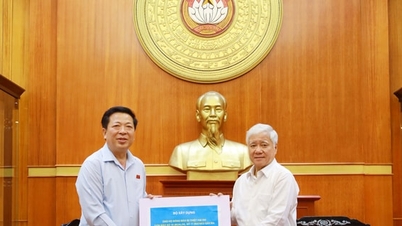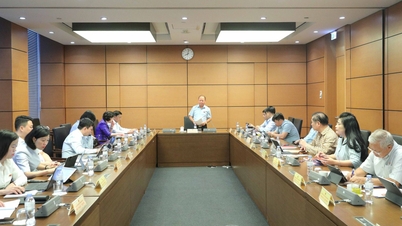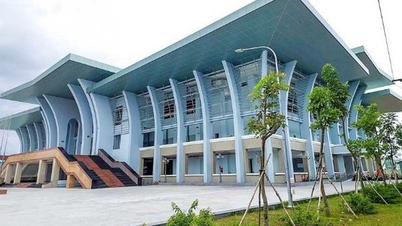Of the more than 1,000 students of Hanoi Medical University graduating in 2025, 46 were excellent, accounting for about 4.3%, down from 2024 and among the lowest in the country. Meanwhile, in other majors, the percentage of excellent and good graduates is much higher, especially in economic schools such as Foreign Trade University graduating in April 2025, nearly 80% of the 1,300 students were excellent and good. In 2025, the National Economics University recorded half of the more than 4,600 students achieving excellent. These "telling numbers" have pointed out the imbalance in the rate of excellent and good graduates in the university education system in recent years.
The story of learning and titles
First of all, it can be seen that the benchmark score for the medical industry ranges from 17-28 points, which is among the schools with relatively high entrance scores. However, the medical industry is famous for its heavy and difficult curriculum. Students have to study for 4-6 years, acquire a huge amount of knowledge, practice continuously at the hospital and face great pressure in clinical practice at the hospital. Therefore, the grading is often very strict, high scores become rare for students in this industry. To become an excellent student, each person needs to have a good grasp of theoretical knowledge and good practice, extremely high requirements make the grading scale in the medical industry more strict.
 |
| Eastern College ( Binh Phuoc Ward) has made many innovations in linking with businesses to combine theory with practice, contributing to improving the quality of training. In the photo: Closing ceremony of intermediate and college classes K2023, K2024 of the school. Photo: Pham Quang |
Meanwhile, many economic schools have a sky-high number of applications, are always the top choice every admission season and have the highest scores. However, during the learning process, economic students are applied a more flexible assessment method with attendance points, group assignments, essays and exams accounting for different proportions, helping students have more opportunities to recover their scores. However, the training is mainly mass, heavy on theory, and lacks connection with businesses. As a result, when students graduate, from a certain perspective, labor productivity is not high, practical skills are weak, and after graduation, they almost need time to retrain.
One reason why the graduation rate of excellent students in many economic schools is high is because education is under pressure to compete in enrollment and promote the brand. Many places tend to "beautify" the output by building assessment standards that are not really close to the reality of work after graduation, thereby helping students easily achieve high scores. This unintentionally creates a mentality of studying to get a degree rather than studying to gain capacity. More dangerously, in some places, negative phenomena have appeared such as: "asking for grades, running for grades", "buying degrees", turning university degrees into negotiable goods. When scores no longer reflect reality, society will lose faith in degrees, and real students will be disadvantaged in the recruitment environment.
On the contrary, the medical industry, due to its direct relationship with human health and life, still maintains strict evaluation standards, resulting in a low graduation rate with excellent grades. This is both a pressure and a guarantee of the quality of each student's medical degree.
Inadequate treatment for those who truly study and work
Another problem is the story of treatment. A doctor has to study for 6 years, practice tirelessly, endure the pressure of life and death, but the starting salary is quite modest. Meanwhile, some economic fields let students graduate earlier, the starting income is quite high even though the actual ability is not necessarily outstanding. This creates a gap between real and virtual value: the degree does not reflect the ability, real students are not rewarded properly, while those who study for less time can easily get good positions. Therefore, the need to build a fairer mechanism becomes urgent: people who study and work for real must be paid fairly. Otherwise, it is very easy to have a "brain drain" - when good doctors find their way abroad to work.
For academies, universities, colleges, and vocational training institutions (colleges and intermediate schools), it is necessary to build a number of schools and advanced training centers specializing in artificial intelligence; focus on arranging and reorganizing existing vocational training institutions to ensure they are streamlined, efficient, and meet standards; strongly decentralize vocational training institutions to local authorities for management...
To overcome the above situation, a comprehensive restructuring of the university education system is needed, focusing on three pillars:
Linking training with practice: It is necessary to radically change teaching methods: reduce theory, increase practice, compulsory internships and assess capacity through real projects. Schools must connect with businesses, hospitals, and social organizations to create a practical learning environment for students right from when they are still in the classroom.
Develop output standards that are close to the reality of work after graduation: Output standards cannot be based solely on course scores. There needs to be a system for assessing actual capacity, professional skills and work attitudes. Standardized exams, competency tests or assessments through professional internships should be included as a mandatory part of the graduation process.
Establish a fair and transparent remuneration system: Salary, bonus and promotion policies need to reflect the true capacity and work efficiency. Specialized fields of study with high contributions but low income such as medicine and education need to be prioritized for support. At the same time, encourage students to study based on their capacity and passion, not chasing after benchmark scores or "field labels".
A revolution in the arrangement of the university education system is needed.
Faced with some of the above shortcomings, the Ministry of Education and Training needs to thoroughly grasp and seriously implement Resolution No. 71-NQ/TW, dated August 22, 2025 of the Politburo on breakthroughs in education and training development. Arrange and consolidate public service units according to the requirements of Resolution No. 19-NQ/TW, dated October 25, 2017 of the 6th Central Conference, Session XII, the Central Steering Committee and the Government on summarizing the implementation of Resolution No. 18-NQ/TW, regulations of the Government, directions of the Prime Minister and instructions of ministries managing sectors and fields (especially the arrangement of public service units at the commune level when implementing the 2-level local government model). Review and reorganize public service units under management in a streamlined, effective and efficient manner, ensuring the principle that one public service unit can provide many public service services of the same type in order to significantly reduce the number of focal points, overcome overlaps, dispersion, and duplication of functions and tasks...
Reforming higher education cannot stop at changing the curriculum or teaching methods. It is a process of restructuring the entire system, from admissions, training organization, quality assessment to the mechanism of using and rewarding human resources. When real learners and real workers are treated fairly and respected for their true value, then education will truly be the foundation for sustainable development, for Vietnam to rise up in the 21st century.
Hien Mai - Hien Dan
Source: https://baodongnai.com.vn/xa-hoi/giao-duc/202510/mat-can-bang-can-can-giao-duc-va-yeu-cau-doi-moi-toan-dien-79e0f37/


![[Photo] Prime Minister Pham Minh Chinh received Mr. Yamamoto Ichita, Governor of Gunma Province (Japan)](https://vphoto.vietnam.vn/thumb/1200x675/vietnam/resource/IMAGE/2025/10/21/1761032833411_dsc-8867-jpg.webp)


![[Photo] Prime Minister Pham Minh Chinh meets with Speaker of the Hungarian National Assembly Kover Laszlo](https://vphoto.vietnam.vn/thumb/1200x675/vietnam/resource/IMAGE/2025/10/20/1760970413415_dsc-8111-jpg.webp)

![[Photo] National Assembly Chairman Tran Thanh Man holds talks with Hungarian National Assembly Chairman Kover Laszlo](https://vphoto.vietnam.vn/thumb/1200x675/vietnam/resource/IMAGE/2025/10/20/1760952711347_ndo_br_bnd-1603-jpg.webp)



























































































Comment (0)